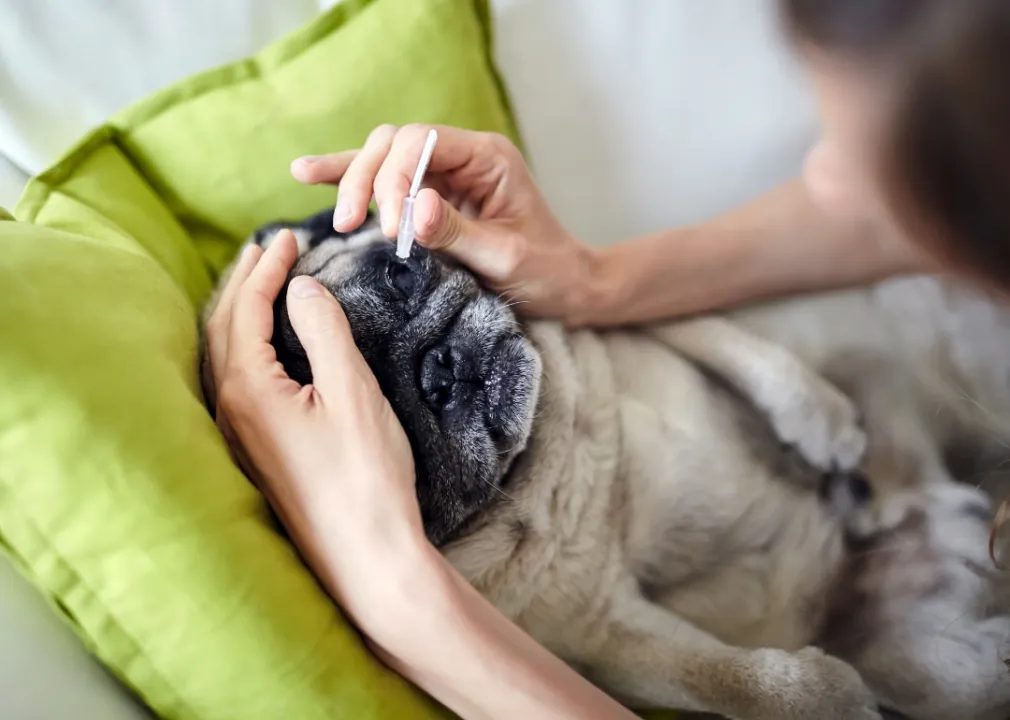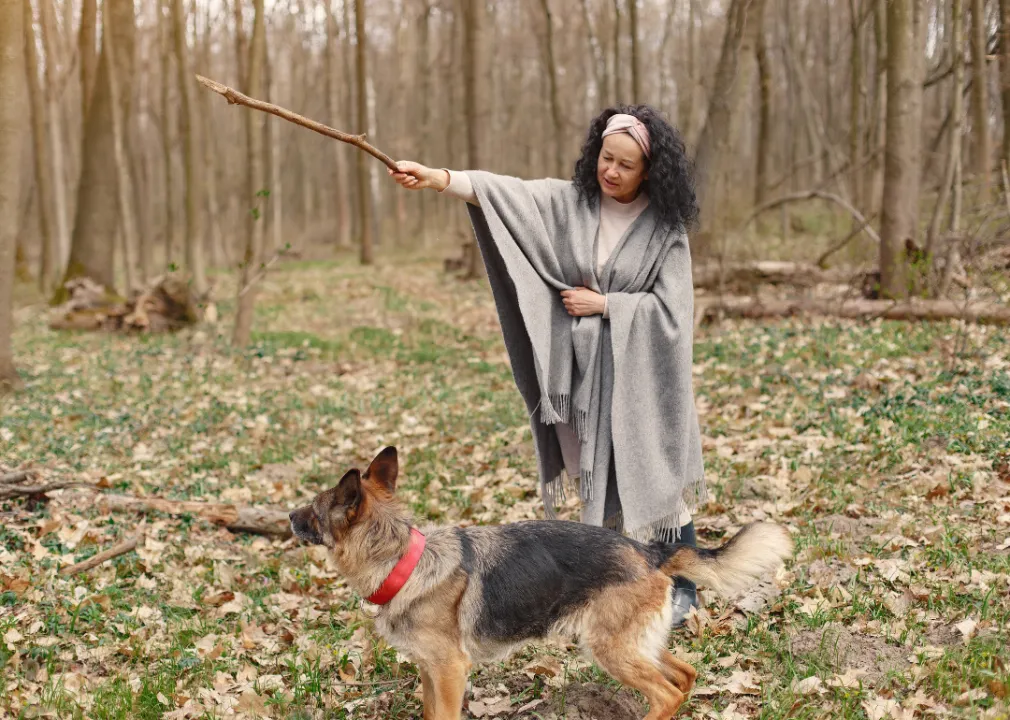Things to consider when adopting a pet
Pets

Audio By Carbonatix
By Nicole Johnson, Stacker

Things to consider when adopting a pet
Pets not only offer friendship and comfort, but they offer health benefits as well. According to the CDC, having pets lowers blood pressure, lowers stress, and helps to combat loneliness. Many people with pets also see an increase in their own fitness and socialization. Adopting a pet has the additional benefit of providing a home for an animal in need.
“Animals are such agreeable friends. They ask no questions; they pass no criticisms,” according to novelist George Eliot. Perhaps their uncomplicated companionship is why the adoption of rescue animals saw a significant increase during COVID-19. Time magazine even named rescue animals its 2020 Pet of the Year.
While adopting a pet is noble, there are many factors to consider, and pet ownership should not be taken lightly. Pets are a serious commitment and require both care and love. Do you have the proper space? Do you have the time? Is everyone in your family on board? How much can you afford to spend on a new pet? These are just a few questions you should ask before bringing home a furry friend.
ManyPets compiled a list of nine things to consider when adopting a pet using information from various animal organizations.

Don’t rush into things
Doing research is important and will help to ensure you make the right decision about adopting a pet. Answering questions about the type of pet you want, and can reasonably and responsibly take care of, is vital and prevents rash decisions that could result in having to return a pet to the shelter. It is estimated that anywhere between 7% to 20% of pets are returned to shelters within the six months following adoption. More often than not, this doesn’t happen because there’s something “wrong” with the pet, but because the pet is wrong for the specific person who adopted them. This can be for a variety of reasons, including pet temperament and allergies, many of which could have been avoided with some upfront and careful consideration. While it's easy to rush into taking the first cute pet home, it is better to wait and know the decision is well thought out. Considering age and, especially for dogs, breeds is an important step: Dogs like huskies require a lot of exercise, whereas dogs like pugs need very little.

Take into account which pet is best for your lifestyle
Do you want a dog to hike or jog with? Maybe you prefer a cat who naps on your lap while you work from home. Taking inventory of things like hobbies, interests, family structure, and work schedule is an important way to gauge which pet will work best for you. If you are a singleton who loves going out, your needs may be different from those of someone with a family who spends weekends at home. If there is another animal in the home, that is another important lifestyle consideration. Every aspect of living arrangements should be considered in this decision. For instance, young children may be knocked over by an energetic, large dog, and guinea pigs may be more ideal for apartment living since they don't require open space for play.

Cats should not be declawed
Years ago, declawing cats was a common practice for cat owners who worried cats would claw at furniture and carpeting. According to the Humane Society, declawing cats hurts them and can have several side effects, including increased biting behaviors and resistance to using litter boxes. It can also cause risks to the physical health of the cat, which include infection and lameness. Several countries and U.S. cities and states have banned declawing. Pet owners should understand the reasons behind scratching (to stretch muscles and mark territory), and they should work with their cats to train them to use scratching posts and have nails trimmed when they begin scratching. Nail caps have become a popular solution for cat owners to reduce scratching.

When adopting a pet, consider finances
There are annual vet vaccinations, a spay or neuter, monthly preventive medicines for heartworm and fleas, and other expenses like grooming, doggie daycare, and food to figure into your budget. Pets also need toys for stimulation and to prevent boredom, as well as items like beds, crates, litter, cages, and leashes. These expenses can add up over the months and years. Pets also often get ill and require surgery or medication, though pet insurance is available to cover many of those costs, and the investment can be worth it, but the monthly premium should be figured into your pet budget. The first year of pet ownership alone can cost between $1,500 to $2,000. Some humane societies and veterinary clinics offer low-cost spay and neuter options, as well as medical services. They may also offer free or discounted pet food, recognizing the sometimes prohibitive costs of animal ownership that can act as an accessibility barrier for potential pet owners.

Pets require time and training
Depending on the age of the pet and their previous living conditions, your new pet may require training, which takes both time and money. It costs about $50 per hour to train a dog, which is the national average. That cost does not include the amount of time it will take and the level of commitment. Working with your pet at home on the training techniques learned is important to solidify any new skills learned. While training may not be required, it is often the key to a happy and well-behaved pet. The benefits are numerous and include a safer pet and home, opportunities for owner and pet bonding, and enjoyable experiences for your pet in public spaces like the vet or park.

Vacations and going out will be harder
Depending on the pet you get, taking vacations and going out after work will require additional planning. Of course, both will still be possible—but dogs require walks and companionship, and cats, fish, or rodents, though much more independent, need fresh food and water. This requires finding someone to care for your pet while you’re away or if you will be working long hours and heading out afterward to dinner or the gym. Daycare and boarding is an option for dogs and cats, but it can be expensive and should be figured into your monthly or annual pet budget. Of course, many hotels and resorts and even restaurants are pet-friendly, and taking your pet with you may be an option worth exploring.

Be prepared for the reality, not the fantasy
Many dream of pet ownership: envisioning the perfect lap cat or dog who rides in the back of the car for downtown adventures. Instead, someone may end up adopting a cat who likes to sit on the opposite end of the couch or a dog who gets car sick. It is important to remember owning a pet may not live up to whatever fantasy you envisioned. Pets, just like people, each come with their own distinct personalities, and the reality is your pet may be different than the one you dreamed of, but that doesn’t mean they can’t be the perfect pet for you. Sometimes reality is better than fantasy.

Pet proofing your home is essential
In the months leading up to bringing a baby home or before a toddler begins walking, parents child-proof their home, outfitting cabinets with locks and moving hazards out of the way. Preparing for pets requires the same safe-proofing of your home. This may be as simple as putting a dog gate up to keep your new pet away from a certain section of the house, or it could be making sure there are no hanging wires the cat can access. Being aware of what's safe for your pet in terms of food, plants, and other chemicals that may be around your home is vital for your pet’s safety. Even gum, elastics, and ibuprofen pose threats. Dogs are allergic to grapes and chocolate, and both cats and dogs can have lethal reactions to certain plants, which requires a thorough sweep of your yard and looking up potential issues with house plants.

Spaying or neutering should be a consideration
Spaying and neutering pets can have health benefits. One University of Georgia study found life expectancy was greater for neutered and spayed dogs. The American Veterinary Medical Association (AVMA) supports the spaying and neutering of pets and believes it is part of responsible pet ownership. Spaying and neutering help to reduce pet overpopulation. The AVMA also discusses the risks associated with sterilization including certain types of cancer and urinary incontinence. Unexpected pregnancy can also result in surprise vet costs and the additional time and money it takes to care for newborn animals.

























